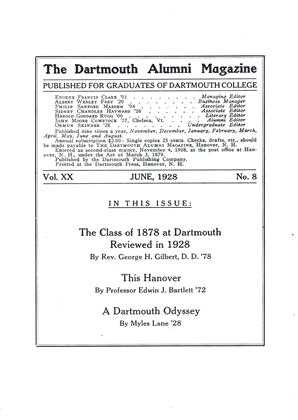The past month has been notable for two radical changes in undergraduate organizations. The most important of these was the decision of the 1928 Palaeopitus to reorganize Palaeopitus on an elective basis, eliminating ex-officio members. The other change was the elimination of the distinction between major and minor sport letters.
Palaeopitus, as reorganized, is now made up of 13 members, instead of 12 as formerly; the former ex-officio membership being replaced by men elected from the different groups of campus activities by the members of the junior class. Palaeopitus believes that the new plan will give that body positive authority by being elective, and make it a more truly representative organization. Before Palaeopitus made the change it submitted the plan to a referendum of the three upper classes, which resulted in 1164 votes for the new plan and only 342 for the old.
Seven undergraduate groups are now represented under the new plan, with four additional members chosen from the class at large. Cabin and Trail nominates two men, one of whom is elected by the Junior Class at large.
The Dartmouth Christian Association nominates two men, one of whom is elected by the Junior Class at large. The Interfraternity Council nominates two men, one of whom is elected by the Junior
Class at large. The Senior and Junior athletic managers nominate two Junior managers, one of whom is elected by the Junior Class at large. The Senior and Junior varsity "D" men in all sports nominate two varsity letter men, one of whom is elected by the Junior Class. The undergraduate officers of all the nonathletic activities (except freshmen) nominate two men representing management and two men representing management and two men representing leaders or presidents, and the Junior Class elects one from each group.
All the college publications, including The Dartmouth, Jack o'Lantern, Pictorial, Aegis, The Tower and The Green Book, nominate four men, two from those representing editorial activity and two from those representing the business activities of the publications. One man from each group is selected by the Junior Class.
There are also four members elected from the class at large. These men must each present a petition signed by at least 25 members of the Junior Class to Palaeopitus, which then prepares a list of the candidates and submits it to the College. The four men receiving the highest number of votes are elected. Palaeopitus includes under this reorganization plan several new functions.
The president of Palaeopitus will appoint an election _ committee of three members of Palaeopitus whose business it will be to care for all college elections.
The railroads will run all special trains. The D. C. A. will act as an Employment Bureau, to select worthy men to handle details of such trains, and the next surtax accruing from the specials will go into the student Loan Fund under the direction of Palaeopitus.
The College Chest will be abolished. A Funds Committee composed of two members of Palaeopitus (to be appointed by the President) and the Bursar of the College will pass on the desirability of all drives, and authorize only those that appear worthy.
Under the new plan the following juniors have been elected to compose the 1929 Palaeopitus by their class: F. W. Andres, of Arlington, Mass., Interfraternity Council (a new organization on Palaeopitus) ; J. W. Hodson, of Waterbury, Conn., Non-Athletic leaders; A. C. Bertch, of Grand Rapids, Mich., Non-Athletic managers; D. W. Orr, of Concord, N. H., Athletic Managers; C. B. Spaeth, of Cleveland, 0., Varsity Letterman; A. P. Clow, of Terryville, Conn., Dartmouth Christian Association; W. L. Scott, of New Rochelle, N. Y., Publication editors; J. J. Ruff, Jr., of Hammond, Ind., Publication business managers; R. B. Sanders, of St. Paul, Minn., Dartmouth Outing Club; elected at large by the Junior Class, R. W. Austin of New York city, R. W. Black of Pekin, Ill., J. W. Bryant of West Newton, Mass., and R. S. Monahan of Pawtucket, R. I.
 View Full Issue
View Full Issue
More From This Issue
-
 Article
ArticleTHIS HANOVER
June 1928 By Professor Edwin J. Bartlett -
 Article
ArticleALUMNI ASSOCIATIONS
June 1928 -
 Article
ArticleTHE CLASS OF 1878 AT DARTMOUTH REVIEWED IN 1928
June 1928 By Rev. George H. Gilbert D. D., '78 -
 Lettter from the Editor
Lettter from the EditorEditorial Comment
June 1928 -
 Article
ArticleA DARTMOUTH ODYSSEY
June 1928 By Myles Lane '28 -
 Article
ArticleANNUAL MEETING OF THE SECRETARIES ASSOCIATION
June 1928
James P. Richardson
-
 Books
Books"The Law as a Vocation"
October 1919 By JAMES P. RICHARDSON -
 Article
ArticleSovietism and Palaeopitus
JUNE, 1928 By James P. Richardson -
 Article
ArticleCampus Competitions End
JUNE, 1928 By James P. Richardson -
 Article
ArticleOuting Club Notes
JUNE, 1928 By James P. Richardson -
 Article
ArticleAlumni Publications
AUGUST 1929 By James P. Richardson -
 Sports
SportsFootball at Dartmouth Since the War
MARCH 1930 By James P. Richardson








